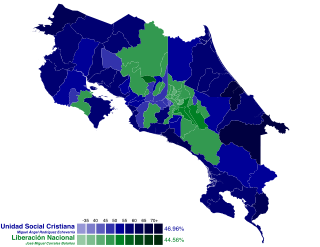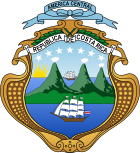
The politics of Costa Rica take place in a framework of a presidential, representative democratic republic, with a multi-party system. Executive power is exercised by the president and their cabinet, and the President of Costa Rica is both the head of state and head of government. Legislative power is vested in the Legislative Assembly. The president and 57 Legislative Assembly deputies are elected for four-year terms. The judiciary operates independently from the executive and the legislature, but is involved in the political process. Costa Rica has a strong system of constitutional checks and balances. Voting is compulsory, but this is not enforced.

A political party is an organization that coordinates candidates to compete in a particular country's elections. It is common for the members of a party to hold similar ideas about politics, and parties may promote specific ideological or policy goals.
A two-party system is a political party system in which two major political parties consistently dominate the political landscape. At any point in time, one of the two parties typically holds a majority in the legislature and is usually referred to as the majority or governing party while the other is the minority or opposition party. Around the world, the term has different meanings. For example, in the United States, the Bahamas, Jamaica, and Zimbabwe, the sense of two-party system describes an arrangement in which all or nearly all elected officials belong to either of the two major parties, and third parties rarely win any seats in the legislature. In such arrangements, two-party systems are thought to result from several factors, like "winner takes all" or "first past the post" election systems. The electoral competition is mostly limited to the two major parties.

The National Liberation Party, nicknamed the verdiblancos, is a political party in Costa Rica. The party is a member of the Socialist International. Social-democratic by statute, the party has a few internal factions, including liberals, Third Way supporters, centrists, and social conservatives.

The Citizens' Action Party is a political party in Costa Rica.

The Social Christian Unity Party is a centre-right political party in Costa Rica.

General elections were held in Costa Rica on 5 February 2006. In the presidential election, Óscar Arias of the National Liberation Party, a former president and Nobel Peace Laureate, was victorious over Ottón Solís of the Citizens' Action Party and twelve other minor-party candidates. Although Arias was expected to win by a wide margin, the actual polling reports were unexpectedly close. However, early results showed the contest to be closer than it actually was. The preliminary official report, after 88.45% of the vote counted, showed the result for President of the Republic almost tied between Arias with 40.51% of the vote and Ottón Solís with 40.29%. Given the small difference of only 3250 votes, the Superior Electoral Tribunal announced that a manual count of all the votes would start immediately and no official winner would be announced until that process was completed, approximately two weeks after the election.

General elections were held in Costa Rica on 7 February 2010. The ruling party before the election, the center-left National Liberation Party, put forward former Vice-President Laura Chinchilla as its presidential candidate, while the libertarian, Movimiento Libertario nominated former legislator Otto Guevara. Opinion polls before voting started consistently put Chinchilla as the front-runner, a trend confirmed in the election-night count, which showed her garnering 46.76% of the vote.

General elections were held in Costa Rica on 6 February 1966. José Joaquín Trejos Fernández of the National Unification Party won the presidential election, whilst the National Liberation Party won the parliamentary election. Voter turnout was 81%.

General elections were held in Costa Rica on 5 February 1978. Rodrigo Carazo Odio of the Unity Coalition won the presidential election, whilst his party also won the parliamentary election. Voter turnout was 81%.

General elections were held in Costa Rica on 2 February 1986. Óscar Arias of the National Liberation Party won the presidential election, whilst his party also won the parliamentary election. Voter turnout was 82%.

General elections were held in Costa Rica on 1 February 1998. Miguel Ángel Rodríguez of the Social Christian Unity Party won the presidential election, whilst his party also won the parliamentary election. Voter turnout was 70%, the lowest since the 1950s.

General elections were held in Costa Rica on 3 February 2002. For the first time in the country's history, no candidate in the presidential election passed the 40% threshold. This meant a second round of voting had to be held on 7 April which saw Abel Pacheco of the Social Christian Unity Party defeat the National Liberation Party's Rolando Araya Monge.

Luis Guillermo Solís Rivera is a Costa Rican politician and educator who was the 47th President of Costa Rica from 2014 to 2018. He is a member of the Citizens' Action Party (PAC).

The National Republican Party was a political party in Costa Rica.
The Democratic Party was a liberal political party in Costa Rica.

The Unity Coalition was a Costa Rican political coalition of right-wing opposition parties made in the 70s and oppose to the then ruling centre-left National Liberation Party. Four parties made the coalition; Democratic Renewal, Christian Democrats, People's Union and Republican Calderonista. After a primary election from which Rodrigo Carazo Odio was victorious the coalition presented him as candidate winning the 1978 elections. Eventually the Coalition merged forming the Social Christian Unity Party in 1983.

The Social Christian Republican Party is a Costa Rican political party founded in 2014 by former president Rafael Ángel Calderón Fournier and his group of supporters as a splinter from the historical Social Christian Unity Party (PUSC). The party also uses the colors and a similar name of Calderón's father's party, the National Republican Party.

Liberalism in Costa Rica is a political philosophy with a long and complex history. Liberals were the hegemonic political group for most of Costa Rica's history especially during the periods of the Free State and the First Republic, however, as the liberal model exhausted itself and new more left-wing reformist movements clashed during the Costa Rican Civil War liberalism was relegated to a secondary role after the Second Costa Rican Republic with the development of Costa Rica's Welfare State and its two-party system controlled by social-democratic and Christian democratic parties.

Calderonism or Calderonismo is a political and ideological doctrine of Costa Rica, which emerged in the 1940s under the leadership of caudillo Dr. Rafael Ángel Calderón Guardia, before, during and after he was president with his National Republican Party, and which was continued by various political forces such as Unity Coalition, National Unification Party and the current Social Christian Unity Party and its split the Social Christian Republican Party. It is together with Liberacionismo one of the two traditional political tendencies of Costa Rican politics, with which it represented a certain type of Costa Rican bipartisanship from 1986 to 2002 and revolves around the Calderón family. It is a form of populist and Catholic Christian socialism very similar to Argentine Peronism.

















